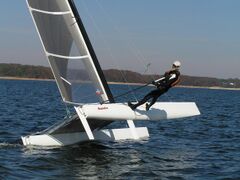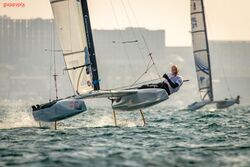International A-class catamaran
Topic: Engineering
 From HandWiki - Reading time: 5 min
From HandWiki - Reading time: 5 min


The A-Class Catamaran, often abbreviated to A-Cat, is a development class sailing catamaran for singlehanded racing.[1]
Background
The class was founded during the late 1950s and was part of the 4-tier IYRU (now World Sailing) approach to divide up the sports catamaran sailing scene into 4 separate groups. These A, B, C and D classes were governed by a very small set of class rules to which each design had to comply.[2] In the beginning it was just:
- Maximum hull length
- Maximum overall width
- Maximum sailarea
All boats designed and built to these specs would be grouped into one fleet and race each other for crossing the finish line first.
The A-Class is the largest remaining of those 4 main classes. The ‘B’ class was a 20 ft twin hander with 235ft2 of sail and developed into the Tornado and a few offshoots such as the F18. The ‘C’ class was another twin, but at 25 ft with a 300ft2 rig, has become a super sophisticated monster and the pinnacle of small cat design that races for the Little America’s Cup. The ‘D’ Class was 32 ft and a sail of 500ft2 with three crew, but rapidly dwindled away.
Specifications
The official organisation for the A-Class catamaran is the IACA (International A division Catamarans Association).
The A-Class rules were expanded over time to prevent the cost of these boats from rising too high and to ensure fairness in racing.
Currently the main A-Class rules are:[3]
- Min overall boat weight : 75 kg / 165.3 lbs
- Max overall boat length : 5.49 m / 18.3 ft (= still the old IYRU rule)
- Max overall boat width : 2.30 m / 7.5 ft (= still the old IYRU rule)
- Max sail area incl. mast : 13.94 m2 / 150.0 ft2 (= still the old IYRU rule)
In handicap racing, the A-Class catamaran uses a Portsmouth Yardstick of 681 in the UK[4] or a D-PN of 64.5 in the USA.[5]
Current situation
The A-Class design has over time converged to a single sail rig using a lightweight carbon mast of about 9 meters length and using lightweight pentex or Kevlar sailcloth. The hulls and beams are often made out of carbon fibre as well, although homebuilt wood or composite materials are still seen on the race circuits.
In the decades since their foundation, the A-Class has gathered a significant international following and it has class organisations in many countries around the globe. Their world championships often attracts around 100 boats and sailors. It is also a class that still contains a significant portion of homebuilders, although their numbers are decreasing with every year due to the skills required to make a competitive boat. However, nearly all A-Class sailors tinker with their setups and boats. As it is a developmental class and the rules do allow so much variation, it is paramount that a top sailor keeps experimenting with new setups and generally tries to improve the design even more. Because of this general character of the class, the A-Class is often leading over other catamaran classes in terms of design development. Over time these other classes copy new findings for their own setups. Examples of such developments are: the carbon mast, the squaretop mainsail, the wave-piercer hull design and in general the use of exotic materials.
In 2017 with the advent of practical foiling designs, the IACA divided the class into an Open (Foiling) division, and a non foiling Classic division for boats with straight or C-shaped foils, and with different class rules to prevent foiling. The two have slightly different SCHRS handicaps, the Open being 0.978, the Classic being 1.008. This allows close racing to continue, and many older boats are still competitive on the Classic circuit particularly.
Builders
Apart from the list below of some of the commercial builders, the A-Class catamaran can be home-built:
- Bimare (Italy) (https://web.archive.org/web/20120823064200/http://www.bimare.org/)
- Aicher-Egner Technologie GmbH (Germany) (http://www.flyer-acat.de/)
- Marstrom (Composite AB Sweden) (http://www.marstrom.com/)
- Scheurer Design & Eng. (Switzerland) (https://web.archive.org/web/20130424015358/http://www.d3-a-cat.com/)
- Scheurer Bootswerft AG (Switzerland) (https://web.archive.org/web/20120705062433/http://www.scheurerwerft.ch/scheurer/)
- VectorWorks Sail (USA)
- Wingfox (Poland) (http://www.wingfox.pl/)
- DNA (Netherlands) (http://dnaperformancesailing.com/)
- Vision (Netherlands) (http://www.catamaranparts.nl/)
- Nikita (Germany)
- Exploder (Poland) (http://www.exploder.info/)
Events
World Championships
| Year | Gold | Silver | Bronze | Ref. |
|---|---|---|---|---|
| 1981 Bontan Bay | ||||
| 1982 Cesenatico | ||||
| 1984 Wellington | ||||
| 1985 Spray Beach | Massimo CORBARA ITA | |||
| 1986 Brenzone | ||||
| 1987 Blairgowrie | ||||
| 1988 Turkey Point | ||||
| 1990 Napier | ||||
| 1991 Grömitz | ||||
| 1992 Silvaplana | ||||
| 1993 Sanguinet | ||||
| 1994 Lake Cootharaba | ||||
| 1995 Andijk | Dario MINELLI | Roman STROBI | ||
| 1996 L'Estartit | ||||
| 1997 Long Beach | ||||
| 1999 Port Phillip | ||||
| 2000 Cesenatico | ||||
| 2001 Castelldefels | ||||
| 2002 Martha's Vineyard | ||||
| 2004 New Plymouth | ||||
| 2005 Sanguinet | ||||
| 2006 Västervik | ||||
| 2007 Islamorada | ||||
| 2008 | NOT HELD | |||
| 2009 Belmont (AUS) | ||||
| 2010 Cesenatico | ||||
| 2011 Århus (DEN) | ||||
| 2012 Islamorada Key | ||||
| 2013 | NOT HELD | |||
| 2014 Takapuna NZL | ||||
| 2015 (ITA) | [6] | |||
| 2016 Medemblik (NED) [7] | ||||
| 2017 Sopot (POL) | [8] | |||
| 2018 Foiling | ||||
| 2018 Classic | ||||
| 2019 Foiling[9] | ||||
| 2019 Classic | ||||
| 2020 | CANCELLED DUE TO COVID| | |||
| 2021 | CANCELLED DUE TO COVID | |||
| 2022 Foil | [10] | |||
| 2022 Classic | ||||
| 2023 Foil | ||||
| 2023 Classic | [11] | |||
Class websites
- International A-Division Catamaran Association (IACA) (https://www.a-cat.org)
- Australia (http://www.a-cat.org.au/)
- Austria (http://www.aaca.at/)
- Belgium (http://www.baca.be)
- Brazil (https://web.archive.org/web/20131214165019/http://www.abca.esp.br/acat/default_por.asp)
- Denmark (http://www.a-cat.dk)
- Germany (http://www.a-cat.info)
- Great Britain (http://www.a-cat.co.uk)
- France (http://www.afcca.org)
- Italy (http://www.classeaitalia.it)
- New Zealand (http://www.a-class.org.nz)
- Netherlands (http://www.a-cat.nl)
- Poland (http://www.katamaran.sopot.pl/aklasa.htm)
- Sweden (http://www.a-cat.se/)
- Switzerland (http://www.saca.ch)
- Spain (http://www.adecat.com)
- United States of America (http://www.usaca.info/)
See also
- List of multihulls
References
- ↑ "BACCA - BACCA British A-Class Catamaran Association". http://www.eyeforlife.com/acat/?file=kop1.php.
- ↑ "Australian International a Division Catamaran Association". http://www.a-cat.org.au/history.html.
- ↑ "Danish A-Class Association". http://a-cat.dk/prog/class_rules.asp?Language=&Menu=2.
- ↑ "Portsmouth Number List 2012". Royal Yachting Association. http://www.rya.org.uk/SiteCollectionDocuments/technical/Web%20Documents/py-general/2012%20listv3.xls.
- ↑ "Multihull Classes". US Sailing. http://offshore.ussailing.org/Portsmouth_Yardstick/Current_Tables/Multihull_Classes.htm.
- ↑ "Home". http://www.aclassworlds2015.it/.
- ↑ http://www.acatworlds2016.nl/
- ↑ "A-CLASS WORLDS 2017 – A-Class World Championship 2017 Sopot". http://aclassworlds2017.pl/test/.
- ↑ "Sailwave results for A-Class Catamaran World Championships 2019 at Weymouth & Portland National Sailing Academy17th to 21st August 2019". https://www.sailwave.com/results/wpnsa/2019_A-Class_Worlds/results.htm.
- ↑ https://www.regattanetwork.com/clubmgmt/applet_regatta_results.php?regatta_id=23423
- ↑ https://www.manage2sail.com/en-US/event/Aclass#!/results?classId=Acat
 |
 KSF
KSF